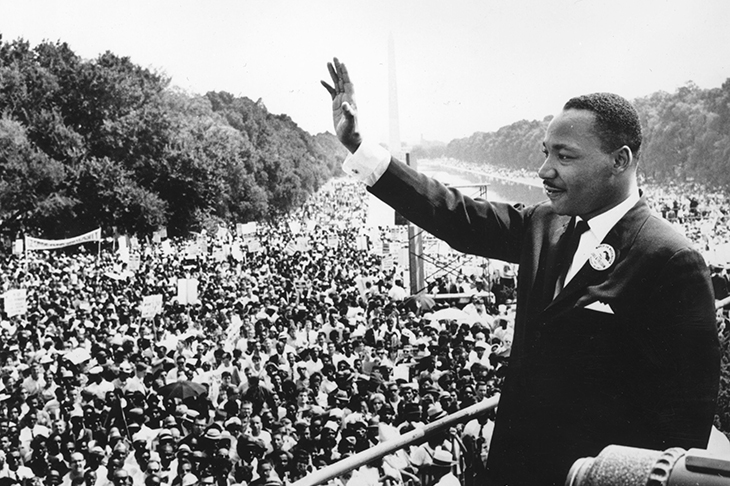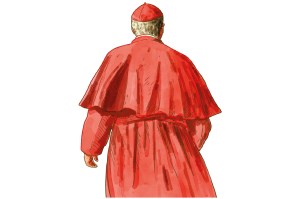For over half a century, we’ve been misunderstanding Martin Luther King. Our secular minds are programmed to see him as a civil rights activist, but as another MLK Day comes and goes, it is time to see King as he saw himself: as a priest and a prophet.
Today, we tend to understand prophecy as focused on prediction. The nature of biblical prophecy and the word’s classical origins have been forgotten. Pro, the prefix of the Greek word prophetes means ‘fore’, but also ‘forth’. To be a prophet is to ‘fore-tell’ but equally to ‘forth-tell’ – to be a divinely-inspired forecaster or to preach moral, spiritual and political messages. King saw his role as the latter.
When King pronounced on the state of American society, it wasn’t only with his own age in mind. His forth-telling was profoundly and self-consciously biblical. Viewed with King’s own lens, his prophetic figure becomes clear.
Take his great Letter from a Birmingham Jail, written in 1963 following his arrest for non-violent protest.
‘Just as the prophets of the eighth century B.C. left their villages and carried their ‘thus saith the Lord’ far beyond the boundaries of their home towns, so am I compelled to carry the gospel of freedom.’
In arguably the key sentence of his 20-page apologia, the Baptist minister equates himself with the Old Testament prophets, explaining to his detractors why he will not stop protesting.
Furthermore, the Birmingham epistle is notable for King’s use of the Old Testament prophet Amos who, like King, is deeply concerned by disparities of wealth and the sins of his nation. With his usual rhetorical flourish, King asks: ‘Was not Amos an extremist for justice?’, later directly quoting the prophet’s plea. ‘Let justice roll down like waters and righteousness like an ever flowing stream.’
Even King’s tone conveys the influence of prophecy, especially of Jeremiah, the great lamenter who condemns the greed and idolatry of the people and warns that punishing calamity will come if Israel remains immoral.
‘The judgment of God is upon the church as never before,’ writes King. ‘If today’s church does not recapture the sacrificial spirit of the early church, it will lose its authenticity and be dismissed as an irrelevant social club with no meaning for the 20th century.’
If King’s prophetic motifs and tenor are clear in his most famous letter, then what about his most famous speech, delivered on August 28 1963 from the foot of the Lincoln Memorial in Washington? There, after the much-celebrated refrain, he cites a long sentence from the prophet Isaiah.
‘I have a dream that one day every valley shall be exalted, every hill and mountain shall be made low, the rough places will be made plain, and the crooked places will be made straight, and the glory of the Lord shall be revealed.’
At the height of his influence and the apex of his rhetorical powers, King chose to see his own aspirations for justice through an Israelite prophet.
‘I Have a Dream’ may be King’s most influential speech, but his most moving is ‘I’ve Been to the Mountaintop’, delivered at a Pentecostal church in Memphis before his last supper. The title is a reference to Moses meeting God on Mount Sinai, and the speech shows King in both prophetic offices: as forth-teller and fore-teller.
The weather that night added to his prophetic aura. Outside, a storm was raging. There was thunder, lightning, and a biblical downpour. It was as though God himself was judging the nation through a latter-day Jeremiah.
After criticizing the illegal injunctions against him and reiterating the right to protest peacefully, he quoted the same Amos passage about justice as in the Letter from a Birmingham Jail.
He then gave another clear indication that he saw his mission in prophetic terms. ‘Somehow the preacher must say with Jesus [quoting from the prophet Isaiah], “The spirit of the Lord is upon me, because He hath anointed me, and He’s anointed me to deal with the problems of the poor.”’
As though no longer able to fight the elements and as though he had prophetic knowledge that this was to be his last sermon, King’s ever-reliable stentorian voice broke up. Memories melted his eyes and changed his tone.
‘Well, I don’t know what will happen now. We’ve got some difficult days ahead. But it really doesn’t matter with me now, because I’ve been to the mountaintop…I just want to do God’s will. And he’s allowed me to go up to the mountain. And I’ve looked over. And I’ve seen the Promised Land. I may not get there with you. But I want you to know tonight, that we, as a people, will get to the Promised Land.’
None of this is to say that King wasn’t a champion of civil rights, the poor or the disenfranchised, but rather that, for King himself, his work was framed not by these secular notions, but by Scripture. At the crux of his greatest speeches and writing we see a clergyman inspired by and in line with the forth-tellers of the Old Testament.
Like Moses, King did not reach the Promised Land. He was a Christian martyr, whose doctrine of nonviolence he traced straight back to the Bible.
He was prophet, priest and King.

























